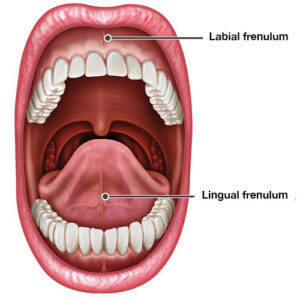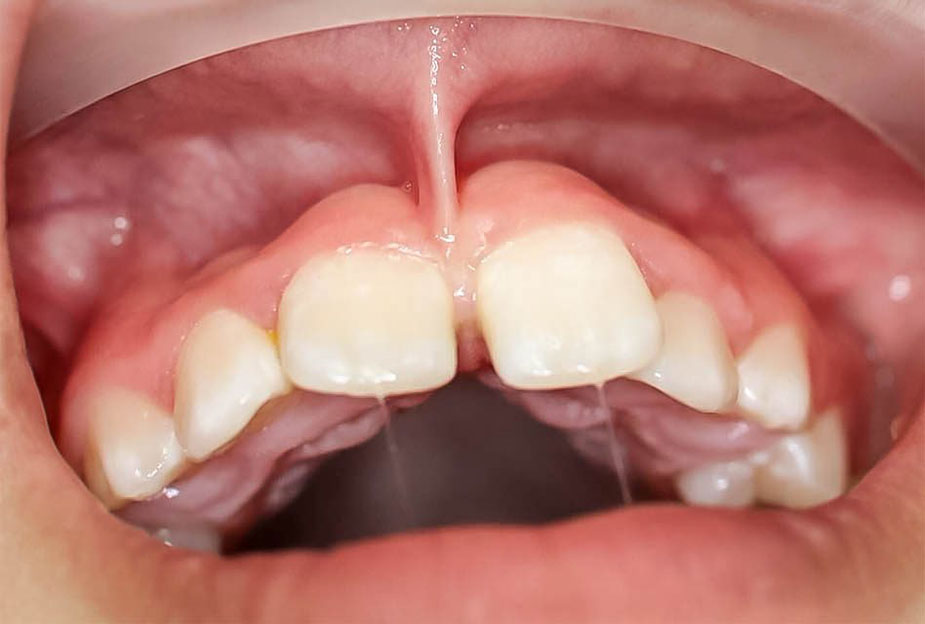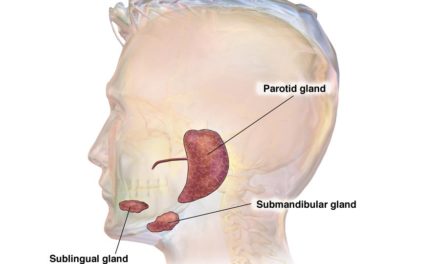Updated 1st of January 2022
A frenulum is a small fold of soft tissue that runs in a thin line. It secures mobile parts of the mouth, usually the tongue or the lips, by restricting their motion. Also called frenum (plural frenula or frena), frenula are not only found in the mouth but in other parts of the body, including the brain, the digestive system, and the genitals.
Frenulum of the tongue
 The lingual frenulum is located under the tongue. It extends from the floor of the mouth (region behind the lower teeth) to the underside of the tongue at the middle. Its function is to limit movements of the tongue. It can be seen when a person raises the tongue to touch the palate.
The lingual frenulum is located under the tongue. It extends from the floor of the mouth (region behind the lower teeth) to the underside of the tongue at the middle. Its function is to limit movements of the tongue. It can be seen when a person raises the tongue to touch the palate.
A lingual frenulum may vary in thickness and length. When it’s too short, it is called tongue tie (or ankyloglossia), which limits the movements of the tongue. If this happens to a baby, it may be difficult to breastfeed efficiently. If this condition stays at an adult age, the person can have difficulty speaking, or even jaw development problems.
Frenulum of the lips
A labial frenulum runs from the lips to the gums, and is found on the top and bottom of the mouth. Labial frenula can be seen if you fold the lip outwards, and they look like a line.
If the frenulum is located on the gums at a position too close to the teeth, it can alter the way teeth erupt. This can result to either gum problems, or spaces between teeth.
Frenulum abnormalities
The purpose of frenula is to give stability to the movements of the lips and the tongue. If a frenulum develops abnormally, it can cause growth problems in the mouth.
Here are some issues that may arise when frenula are too short or tight:
- discomfort while swallowing
- frenulum tear
- upper two front teeth erupt abnormally and causing a gap between them
- problems with nursing if the tongue or lip frenula are tight
- speech difficulties if the lingual frenulum is tight
- pulling the gums away from the from teeth, which would expose the roots of those teeth
- possible snoring and mouth breathing if the frenula abnormalities cause a problem with jaw development.
Frenectomy
A frenectomy (or frenulectomy) is a minor surgery that consists of the removal or untightening of a problematic frenulum. This procedure is recommended when a patient’s frenulum gets in the way of normal use or development in the mouth, or when it’s too tight and tears frequently.
Frenectomies are usually done in children who cannot breastfeed properly or speak abnormally due to a tight or short frenulum.
In 2020, medical professionals noted that unnecessary frenectomies were performed because they were encouraged by information that parents found online. It’s therefore important to consult a doctor for proper examination of the abnormal frenulum before frenectomy is performed.
But if frenectomy is recommended, it is a short and simple surgery done by an oral surgeon, under local anaesthesia. The procedure may be performed with a scalpel, electrosurgery, or even laser. Recovery time is quick, generally lasting a few days.
References
- Rowan-Legg A. (Ankyloglossia and breastfeeding). Paediatr Child Health. 2015 May; 20(4): 209–213.
- Devishree, Gujjari S K, Shbhashini P V. (Frenectomy: A Review with the Reports of Surgical Techniques). J Clin Diagn Res. 2012 Nov; 6(9): 1587–1592.
- HealthLine, (What Is a Frenum).
- Wikipedia, (Frenulum).





